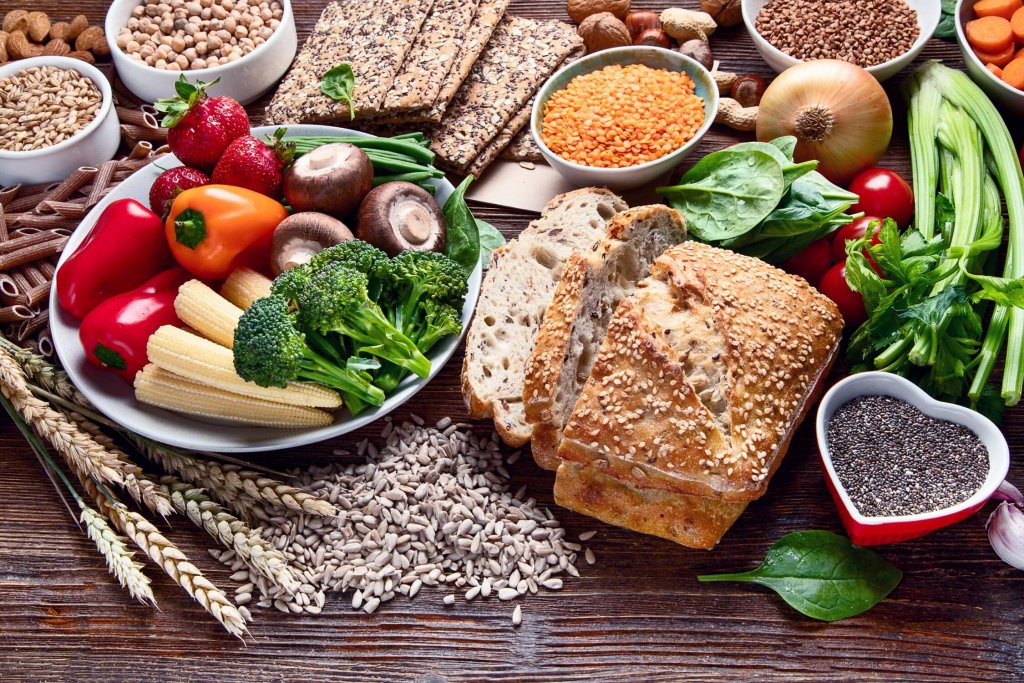A diet has the biggest impact on the composition of gut microbiota, its diversity and abundance. In the past few decades, eating habits have changed significantly which has also been reflected in increasingly common digestive problems. A Western diet leads to reduced diversity of gut microbiota, while a Mediterranean diet is connected to a bigger diversity and stability of microbiota.
The knowledge about the connection between gut microbiota and health has significantly increased during the last few decades. Now we know that the altered microbiota is linked to many diseases, including mental and digestive ones, obesity, and type 2 diabetes.
Diversity, versatility, and abundance of the gut microbiota, as well as a favorable ratio between the main representatives of Bacteroidetes and Firmicutes bacteria, are a sign of good microbiota and an excellent way towards a good general condition. Nutritionally complete foods, and especially fiber, are the main drivers of microbial diversity.
Why is fiber intake important for gut microbiota?
The biggest part of microbiota is in the large intestine which provides a favorable environment for survival. A human being is unable to digest fiber due to a lack of certain enzymes. However, the fiber is not unused since it is being beneficially used and fermented by our gut microbiota in the large intestine, while at the same time creating bacterial metabolites, and short-chain fatty acids (butyrate, acetate, and propionate).

These short-chain fatty acids play an important role in the regulation of appetite, intestinal barrier function, lipid metabolism, inhibition of pathogenic organisms, improvement of the immune system, the integrity of the blood-brain barrier, protection from colon cancer and they are fuel for our gut cells (butyrate).
We have to understand that by choosing our food we are not nourishing only ourselves, but also our gut microbiota because the microbes in the gut compete with each other for nutrients and space. Quality, quantity, and time of food intake play a crucial role in creating gut microbiota and gut functioning.
So, by eating the right food we can stimulate the growth of useful bacteria, and by having a bad diet we can reduce the diversity of the gut microbiota and stimulate the growth of harmful bacteria.
Changes in the composition of gut microbiota have a determining effect both on our general condition and health status.
Why should we take care of our gut microbiota?
Gut microbiota has multiple important roles in our body:
- It helps in the metabolism of the food that arrives in the large intestine undigested and thereby enables the use of nutrients that would otherwise be lost in the stools,
- It helps in the synthesis and metabolism of essential nutrients, such as short-chain fatty acids, vitamin K, thiamin, biotin, B6, and neurotransmitters (serotonin)…,
- It educates and directly regulates our immune system (it affects the balance of inflammatory and anti-inflammatory processes in the gut),
- Microbic fermentation of fiber creates a mildly acid environment in the gut which inhibits excessive growth of harmful bacteria and thereby maintains the balance between useful and opportunistic microorganisms,
- Its most important role is to maintain the integrity of the gut.
Due to all the above-stated and probably many other, still undiscovered roles, a disrupted system in the gut microbiota can lead to health deterioration.
Diets that have a negative impact on the gut microbiota
Impact of a Western diet on the gut microbiota
With urbanization, our life habits have significantly changed in the last century. We spend more time at our workplace and therefore we have less time to eat so we look for quick solutions. The food industry has seen that as an advantage and used it, so we are presented with different options at every step.
Such a diet is based on excessive energy intake, a high intake of processed foods rich in additives, simple sugars and saturated fats, and a significantly higher intake of animal proteins. On the other hand, such a diet is characterized by insufficient fiber intake (fruit, vegetables, legumes, and wholegrain cereals).
Intake of such foods does not create a favorable environment for useful bacteria, and it actually stimulates the growth of those bacteria which, when there are too many of them, reduce the integrity of the intestine wall.
It has been observed in the studies that people who mostly eat highly processed food have:
- Reduced diversity of gut microbiota and an increased level of endotoxins (lipopolysaccharides) in their bloodstream, which indicates that they have an increased intestinal permeability and a higher number of bacteria that have lipopolysaccharides in their cell wall.
- A reduced level of useful short-chain fatty acids.
It is all related to inflammation and a higher risk for the development of chronic diseases. Unfortunately, the Western diet has become a standard in developed countries, and it is becoming increasingly present in developing countries, too.

Impact of nutrition strategies based on a high intake of fat or on nutrients of animal origin (ketogenic and meat diet) on gut microbiota
The ketogenic diet is a special type of diet in which the intake of carbohydrates is carefully watched. With an extremely low intake of carbohydrates (usually less than 50 g/day) and a high intake of fat, we achieve the production of ketonic bodies in the liver, which our body later uses as fuel.
Such diets with an extremely high proportion of fat reduce the number of useful bifidobacteria and lactobacilli because ketonic bodies inhibit the growth of these bacteria and thereby the production of butyrate, the main fuel of gut cells. Meanwhile, the number of certain types of bacteria from the Firmicutes family increases, which is related to excessive body weight. However, it has not been researched enough whether the main cause is a high intake of fat or lack of fiber that accompany such a diet.
A meat diet (originally a carnivore diet) is one of the latest very popular diets that are extremely restrictive and is based on the intake of nutrients of predominantly animal origin (meat, fish, eggs, dairy products) and exclusion of all the nutrients of plant origin (fruit, vegetables, nuts, seeds, cereals…).
How does a meat diet affect the gut microbiota?
A high intake of animal protein (which is usually followed by a higher intake of saturated fats) is related to an increased number of Bacteroides which degrade the intestinal mucosa, increase the gut permeability, and produce metabolites linked to colon cancer, and reduction of useful lactobacilli.
Degradation of the intestinal mucosa is a natural process that happens daily. However, it can be observed that the degradation happens faster in case of a high intake of animal protein and, parallelly, an insufficient intake of plant fiber.
Sometimes such a diet with a reduced intake of plant fiber can lead to reduced bloating and gas, but that does not mean that our intestines are healthy.
Indeed, a high intake of animal protein and, parallelly, a low intake of plant nutrients (in these strategies mostly cereals and legumes) with a negative impact on the composition of the gut microbiota, reduces the production of butyrate, which also contributes to the elevation of pH in the large intestine, which stimulates the colonization of opportunistic and harmful bacteria in the gut.
In case when a ketogenic diet is necessary due to medical reasons, we can reduce the negative impact on microbiota by an increased intake of fiber from fruit, proteins from whey, and plant proteins (e.g., beans proteins) and an intake of omega 3 fatty acids (fish, nuts, seeds…).

Impact of a gluten-free diet on the gut microbiota
A gluten-free diet is sometimes necessary due to health reasons (e.g., celiac disease, non-celiac gluten sensitivity) and for now there is still no other solution but to strictly remove gluten from one’s diet. We often avoid gluten due to other, not necessarily health reasons. In both cases, we should be aware that a long-term gluten-free diet has shown a reduction in microbic diversity, which can be prevented by a sufficient intake of fiber from other kinds of whole-grain, gluten-free cereals, fruit, and vegetables.
Diets that have a beneficial impact on the gut and gut microbiota
Vegetarianism / Veganism
Unlike omnivores, vegans completely exclude all the nutrients of animal origin and their products (dairy and honey), while vegetarians still include one or more foodstuffs of animal origin in their diet (fish, eggs, and dairy). Their microbiota differentiates from the one of omnivores due to a different diet, and differences between vegetarians and vegans are minimal.
What is the situation with the diversity of gut microbiota in people who are exclusively herbivores?
Vegetarians and vegans often include more nutrients of plant origin in their diet, and that is why they have a higher intake of fiber and plant proteins in comparison with omnivores and we would expect that it would have an impact on a bigger diversity of gut microbiota. However, current research gives different results because the food of animal origin, which is avoided by this group of people, also contributes to the diversity of gut microbiota.
Still, before you start thinking that it doesn’t matter what you eat, wait a moment. Studies have shown that vegetarians and vegans have a bigger production of short-chain fatty acids and more of those bacteria that are good for our health.
Vegetarianism and veganism are not going to be of any big use to us, i.e., they can even be unhealthy if we eat vegan and vegetarian highly processed products. So, a comprehensive, mostly plant-based diet is a diet that will satisfy our microbiota.

A Mediterranean diet
Finally, most probably the best diet that will completely support our health and gut microbiota.
The concept of the Mediterranean diet summarizes a traditional diet of the inhabitants of Crete, Greece, and the southern Italian region around 1960. Numerous studies have shown an extremely positive impact of the Mediterranean diet on all health indicators and the gut microbiota.
Characteristics of the Mediterranean diet are:
- A high intake of plant nutrients, and thereby polyphenolic substances from fruit and vegetables, olives and olive oil, nuts, legumes, and aromatic spices and herbs. They have antioxidative, anti-inflammatory properties and stimulate the growth of bacteria that produce more short-chain fatty acids, improve the intestinal wall, and reduce inflammation of the intestine.
- an intake of a minimum of 14 g of fiber on 1000 kcal, which is almost double quantity in comparison with the Western diet (8 g of fiber/1000 kcal),
- A high intake of fiber with prebiotic properties (e.g., garlic and onion) and carbohydrates with a low glycemic index (legumes, wholegrain cereals)
- A high intake of unsaturated fatty acids and omega-3 fatty acids from fish (extra-virgin olive oil represents the main source of fat in a Mediterranean diet),
- A higher intake of plant protein,
- A low intake of animal protein (once a week at most, and primarily lean meat), processed food (for example, processed red meat) and saturated fats (butter, pork cracklings (čvarci)),
- A moderate intake of dairy products (mostly in the form of fermented products).
People who mostly follow a Mediterranean diet have a bigger microbial diversity, with the presence of useful bacteria lactobacilli and bifidobacteria.
Such a microbial composition and intake of nutrients that are good for the body lead to a bigger production of short-chain fatty acids substances, and thereby to a reduced risk of imbalance and increased intestinal permeability.
For example, the number of Faecalibacterium prausnitzii and Roseburia hominis is positively linked to the consumption of fruit, red wine, fatty fish, legumes, and cereals, but also negatively to the consumption of products with increased sugar content. These bacteria are known for their anti-inflammatory properties, and they contribute to the protection of the intestinal wall with the fermentation of fiber.

Final message
Keep in mind that for the balanced gut microbiota and its maintenance it is recommended to reduce the intake of processed food and saturated fats and to eat diverse, colorful food that is primarily based on plant nutrients (fruit and vegetables, legumes, wholegrain cereals) and a favorable intake of omega-3 fatty acids.
Such a diet increases the microbial diversity and improves the ratio between the useful and harmful bacteria, which leads to good intestinal integrity, reduced oxidative stress and inflammations, better insulin sensitivity and immune system functioning, and reduces the risk of developing a number of chronic diseases, which are related to low-grade inflammations.
Choose chapter:






